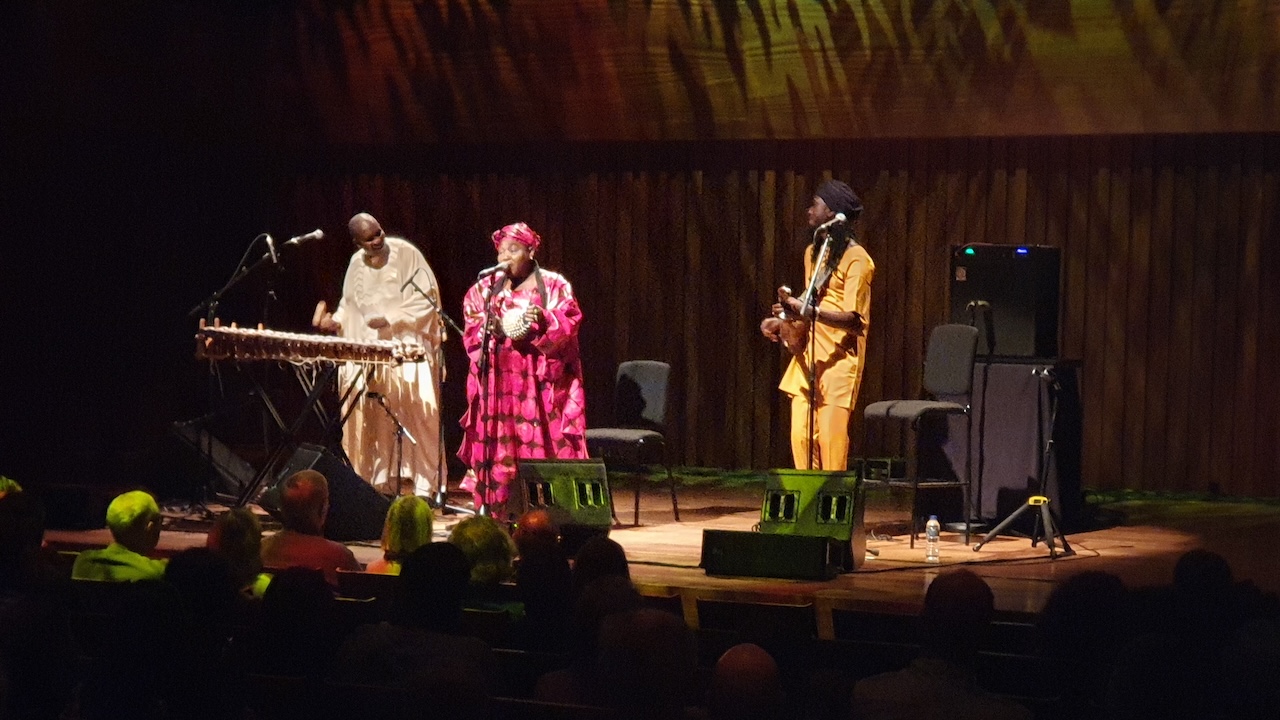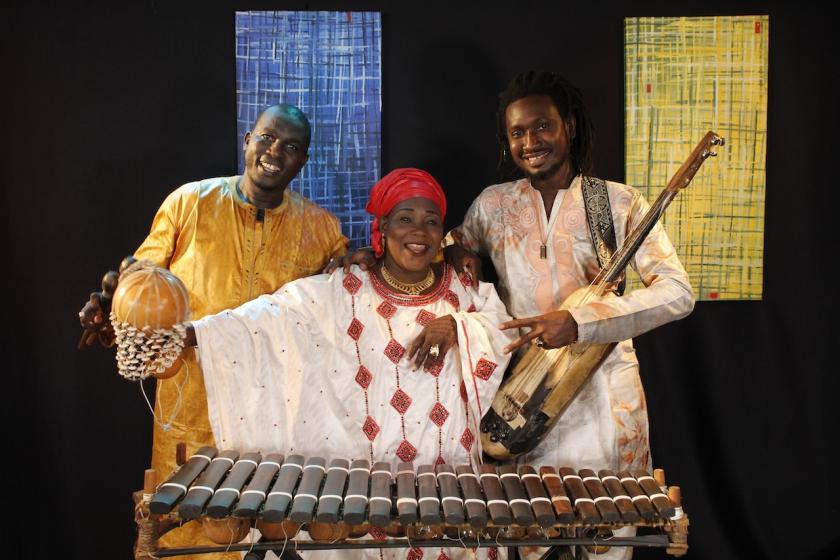Trio Da Kali are griots, and their traditional role in West Africa is to connect: to evoke the glories of the past and to bring communities together through mediation and spiritual admonition. Their role, even though sung in Bambara, without surtitles – a thought worth considering – could not be more appropriate in a world so perilously divided.
Their performance at the Barbican’s Milton Court concert hall transported the audience into a space in which boundaries were erased, and hearts open full-wide. The members of the trio are all three outstanding musicians: Lassana Diabaté is widely considered the most accomplished balafonist today. Not only has he absorbed the intricacies of a great tradition, but he plays with risk-taking joy and a mastery nourished by contact – as he stresses in his charming introductions – with jazz and the blues. There isn’t just undeniable virtuosity, but a playful use of syncopation and the breaking of regular beats that would easily find its place in contexts far removed from the Guinea of his birth.
Madou Kouyaté is the son of the ngoni star Bassekou Kouyaté, and he plays a bass version of the instrument, which references instruments favoured by the hunters’ fraternities – the bolon and kamele ngoni, but also manages to sound like an otherworldly mix of the breathtaking explorations by jazz giant Scott La Faro (who played bass in Bill Evans’s 1960’s trio) and the trance-inducing pulse of the gunbri which provides the heart the music of the Gnaoua, the great healers of the Maghreb.
Hawa Kasse Mady Diabaté stands out among the wonderful vocalists of Mali – Oumou Sangaré and Fatoumata Diawara, Kandia Kouyaté, Rokia Traoré and others. She is the daughter of one of West Africa's greatest singers, Kassé Mady Diabaté, a man revered for his ability to open hearts and nourish vision.She can sing as softly and sensually as the best jazz vocalists, but she can also give her voice maximum power, in moments of great moral exhortation that cannot fail to move those who listen. She has a quality of "cool" – that West African aesthetic quality, not the over-used buzz word now used to describe anything plain good, but “the Cool”, so well evoked by the Africanist Robert Farris Thompson in an article for African Arts in 1973, a cousin of the duende that Lorca wrote about – that enables her to do more with less, even when she is going for broke. She shares with a father a certain sweetness of tone, that subtly but forcefully carries a great deal of soul and emotion. Hawa Kassé Mady was beautifully supported by her fellow musicians. They were much more than accompanists, and you could tell how much she appreciated their presence. The interactions between balafon and ngoni then, notably on “Kaninba” demonstrated a magical complicity that underpinned the vocals with admirable sensitivity to rhythm and phrasing. The set started slowly, with "Tita", a song that the Trio had recorded on their first award-winning album Ladilikan with the Kronos Quartet. They gradually built the tempo up, as if in a ceremony of enchantment. Griots, it must be noted, also connect those who hear them to the spirits, the ones that heal rather than the ones who might be a threat. By the time they had reached the more uptempo "Dissa" (a track from their most recent album Bagola), they had found a new stride, one that encouraged dancing – and it felt, undeniably, as if a seated concert hall might not be suited to music that is made for the full and joyful engagement of the whole body.
Hawa Kassé Mady was beautifully supported by her fellow musicians. They were much more than accompanists, and you could tell how much she appreciated their presence. The interactions between balafon and ngoni then, notably on “Kaninba” demonstrated a magical complicity that underpinned the vocals with admirable sensitivity to rhythm and phrasing. The set started slowly, with "Tita", a song that the Trio had recorded on their first award-winning album Ladilikan with the Kronos Quartet. They gradually built the tempo up, as if in a ceremony of enchantment. Griots, it must be noted, also connect those who hear them to the spirits, the ones that heal rather than the ones who might be a threat. By the time they had reached the more uptempo "Dissa" (a track from their most recent album Bagola), they had found a new stride, one that encouraged dancing – and it felt, undeniably, as if a seated concert hall might not be suited to music that is made for the full and joyful engagement of the whole body.
In her lyrics, Hawa places most emphasis on praise for ancestors, fellow musicians and the two men on the stage. As in so many West African singing, she had a message, and a deeply moral one. The up-tempo and most danceable ”Eh Ya Ye” spoke of the importance of honesty and the danger of dodgy diviners, and “Ladilikan” of the need to live one’s life as an example to others, not just merely preach. And yet, in her cool way, Hawa Kassé Mady is a preacher. It’s easy to see how that moral tradition as a mainstay of music survived the Middle Passage and slavery, and how a similar drive to make people act right has always been present in gospel, soul and the best of hip-hop too.
The first encore, “Orpaillage”, an edge-of-your-seat slow number – almost dangerously quiet – offered the most stirring moment of the night. Hawa’s voice at is purest, meshed with Madou Kouyaté’s deep but unobtrusive baryton, the balafon struck so delicately by Lassana Diabaté, as if he were caressing a new-born child. This was magic beyond belief, beyond words, a deeply transformative moment.
Lucy Duran, a kind of honorary griot herself, as she's done so much to make the the music of West Africa not just better known but appreciated for its cultural sophistication, and who was the driving force behind Trio Da Kali's creation and their recordings with the Kronos Quartet, explained the lyrics of "Orpaillage" to me: " It was their own composition on the spot in the studio when they recorded the album Bagola - in protest against the use of mercury in informal gold mining which kills fish, rivers and children. Many people", she added, "have left their homes and small industries and just dig the land up for gold - digging at great peril to their own lives and to climate". The backstory enriched the memory of a very powerful expterience.
There is nothing fusty or purist about Trio Da Kali’s reverence for tradition: the ancestors’ presence is what binds community and teaches those who listen to follow their hearts. They draw on their roots but are alert to the various musics they have heard on the way – jazz, blues, and Latin roots. That has been the case for a long while with African popular music – from the Cuban influences on early Youssou N‘Dour and Salif Keita, through to the Delta Blues on the likes of Ali Farka Toure and other purveyors of "Desert Blues". Trio Da Kali’s musical curiosity and receptivity – nourished no doubt by interaction with the Kronos Quartet and others – provide a remarkable vitality to their music. They do the griot tradition proud, and it’s a privilege indeed to share in a magical voyage that combines homage to the past with joyful discovery.















Add comment